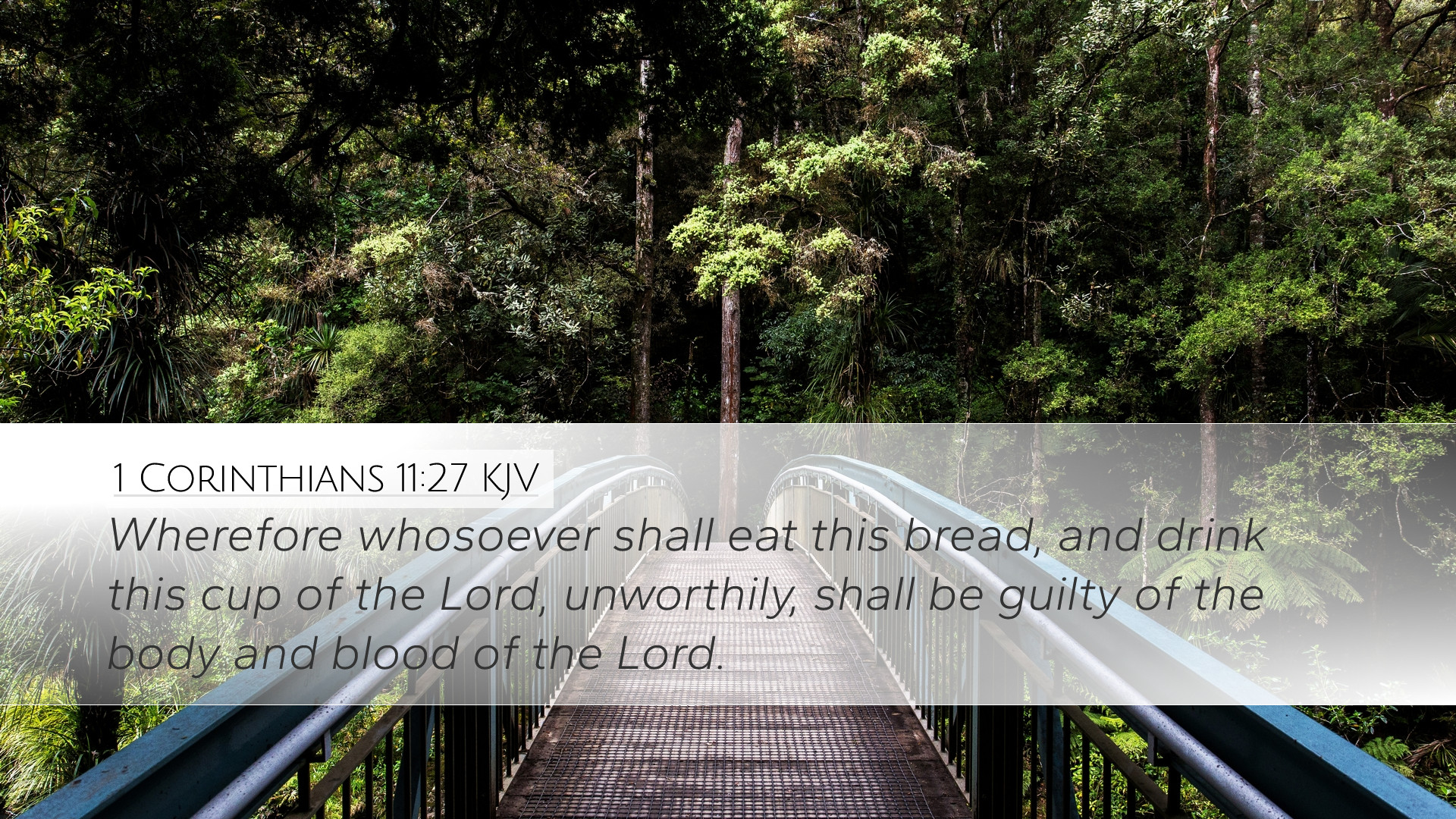Commentary on 1 Corinthians 11:27
Verse Text: "Whoever, therefore, eats the bread or drinks the cup of the Lord in an unworthy manner will be guilty concerning the body and blood of the Lord."
Introduction
This verse serves as a poignant reminder of the seriousness of partaking in the Lord's Supper. The apostle Paul addresses the Corinthian church, emphasizing the significance of approaching communion with reverence and self-examination. Various public domain commentaries provide insights into the implications of this verse for both the individual believer and the broader church community.
Exegesis of the Verse
Matthew Henry: Henry emphasizes the "unworthy manner" as a failure to recognize the sacredness of the elements involved in communion. He elaborates that participating without discernment can lead to a serious offense against Christ's sacrifice. The "body and blood of the Lord" symbolizes the profundity of Christ's atoning work and reminding congregants to approach with respect and acknowledgment of their own sinfulness.
Albert Barnes: Barnes points out that the phrase "guilty concerning the body and blood of the Lord" underscores the spiritual necessity of approaching the Lord’s Supper thoughtfully. He elucidates that one who partakes without reflection on Christ's sacrifice or the unity of the church community brings judgment upon themselves. This also serves as a warning to evaluate one's state of faith and repentance before participating in communion.
Adam Clarke: Clarke provides a historical context that highlights how the Corinthian believers were misusing the Lord’s Supper, treating it as a common meal rather than a sacred communion. He stresses the value of examining oneself, leading to a greater appreciation of the grace provided through Christ's blood and a reminder of the covenant made with believers.
Theological Implications
- The Holiness of Communion: The act of communion is not merely a tradition; it represents a covenant relationship with Christ. Believers must approach this sacrament with the utmost reverence.
- Self-Examination: This verse prompts a theological reflection on the necessity of personal introspection. Before approaching the Table, each believer is encouraged to evaluate their faith, relationships, and spiritual condition.
- Community Unity: Paul’s admonition underlines the importance of unity within the body of Christ. Approaching communion in a divided or contentious spirit can lead to further schisms within the church community.
- Consequences of Irreverence: The warning of being “guilty” suggests that there are spiritual ramifications for neglecting the holiness of this act, underscoring the serious consequences tied to a carelessly conducted communion service.
Practical Application for Believers
For pastors and church leaders, this passage serves as both a call to lead with integrity and a warning to provide adequate teaching on the significance of communion. It is crucial for churches to cultivate an environment where believers can realistically assess their readiness for communion.
- Encourage Preparation: Pastors should guide congregants to prepare spiritually before partaking in communion, fostering a habit of confession and reflection.
- Promote Collective Worship: Highlighting the importance of communal unity and how personal grievances can disrupt the participatory aspects of communion is vital.
- Teach on the Significance: Regular teaching on the nature and significance of the Lord's Supper can elevate the congregation's view of this sacrament, reinforcing its importance as a central element of worship.
Conclusion
1 Corinthians 11:27 serves as a vital reminder for believers to always approach the Lord’s Table with a heart tuned to reverence, reflection, and readiness. As Matthew Henry, Albert Barnes, and Adam Clarke illuminate in their commentaries, understanding the gravity of this verse can lead to a more meaningful and spiritually enriching experience within the community of faith. Pastors, scholars, and students of theology are called not just to interpret this passage but to live it out in their teaching and personal practice.


